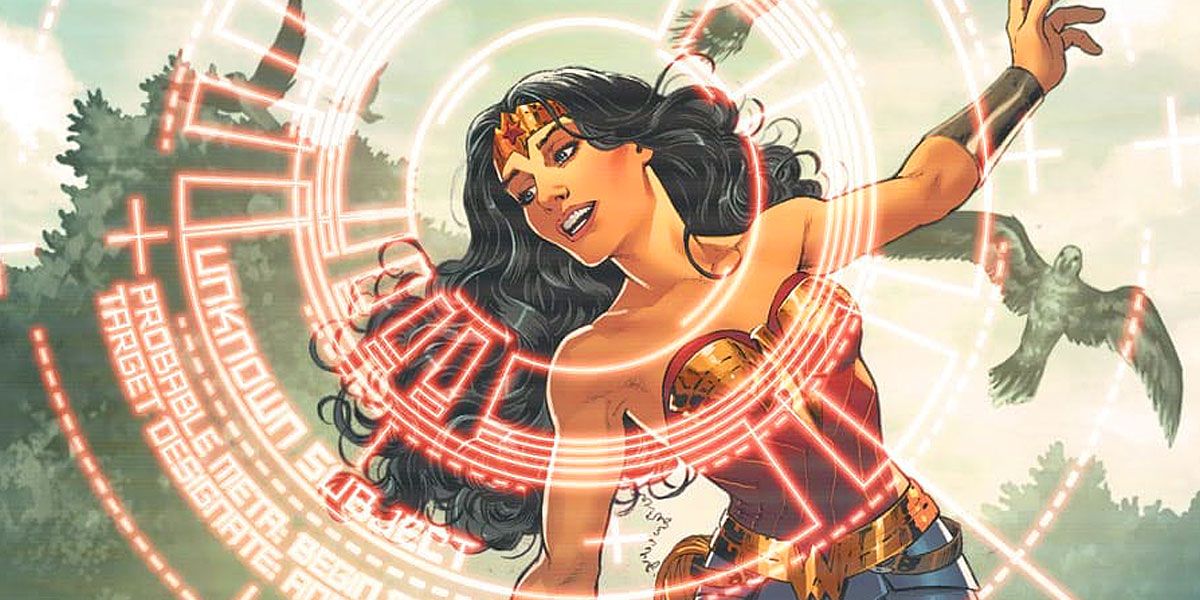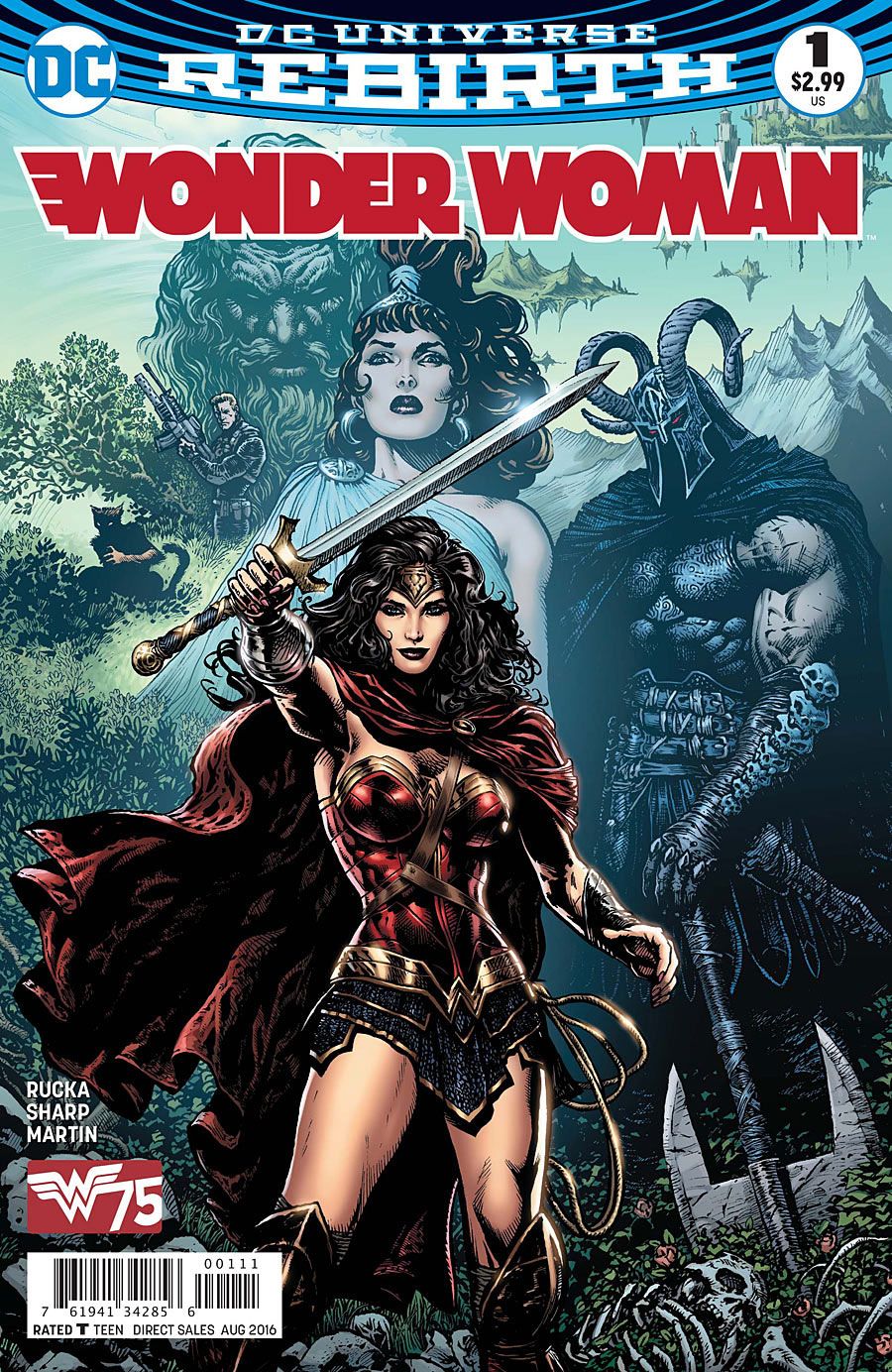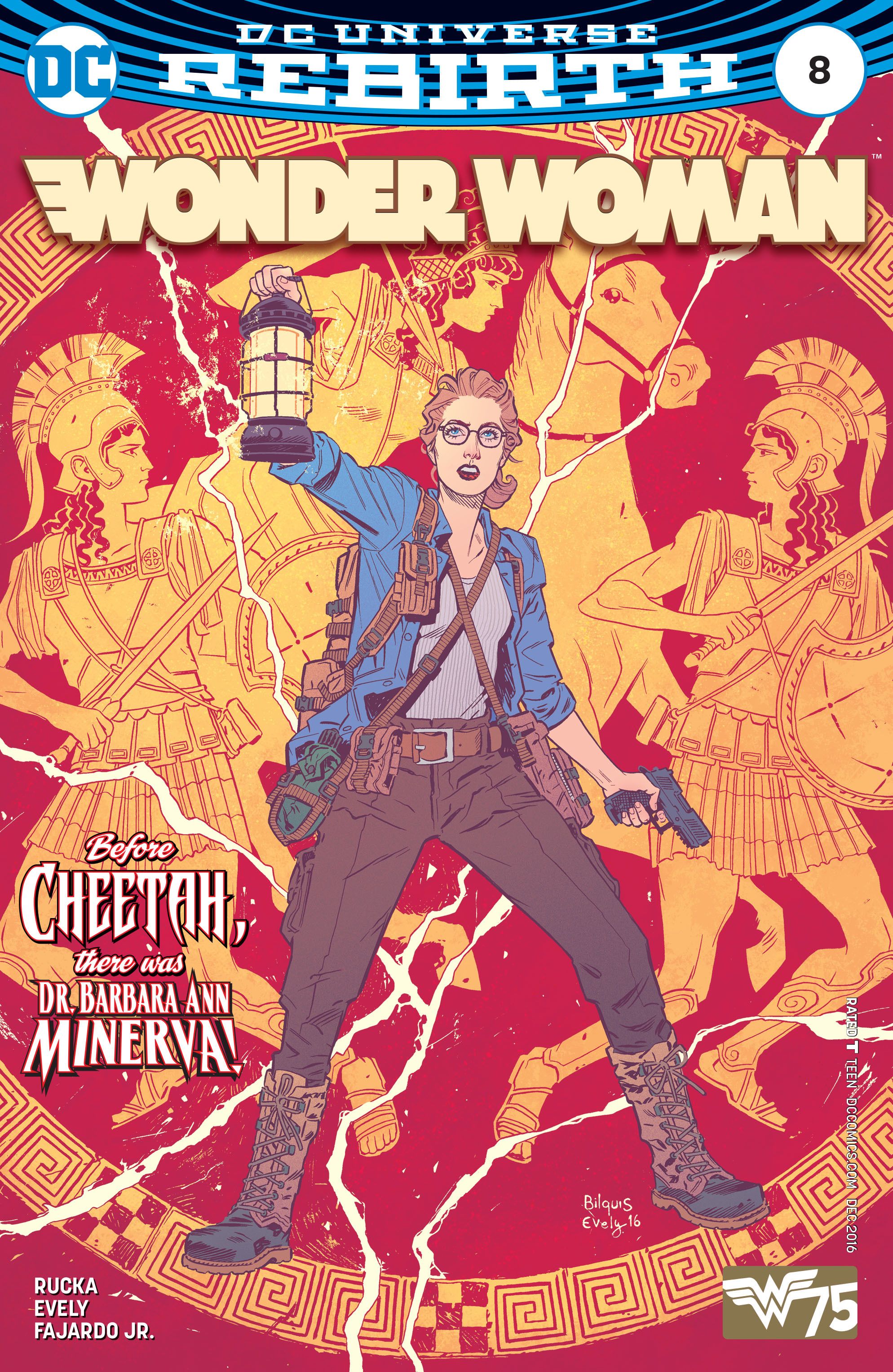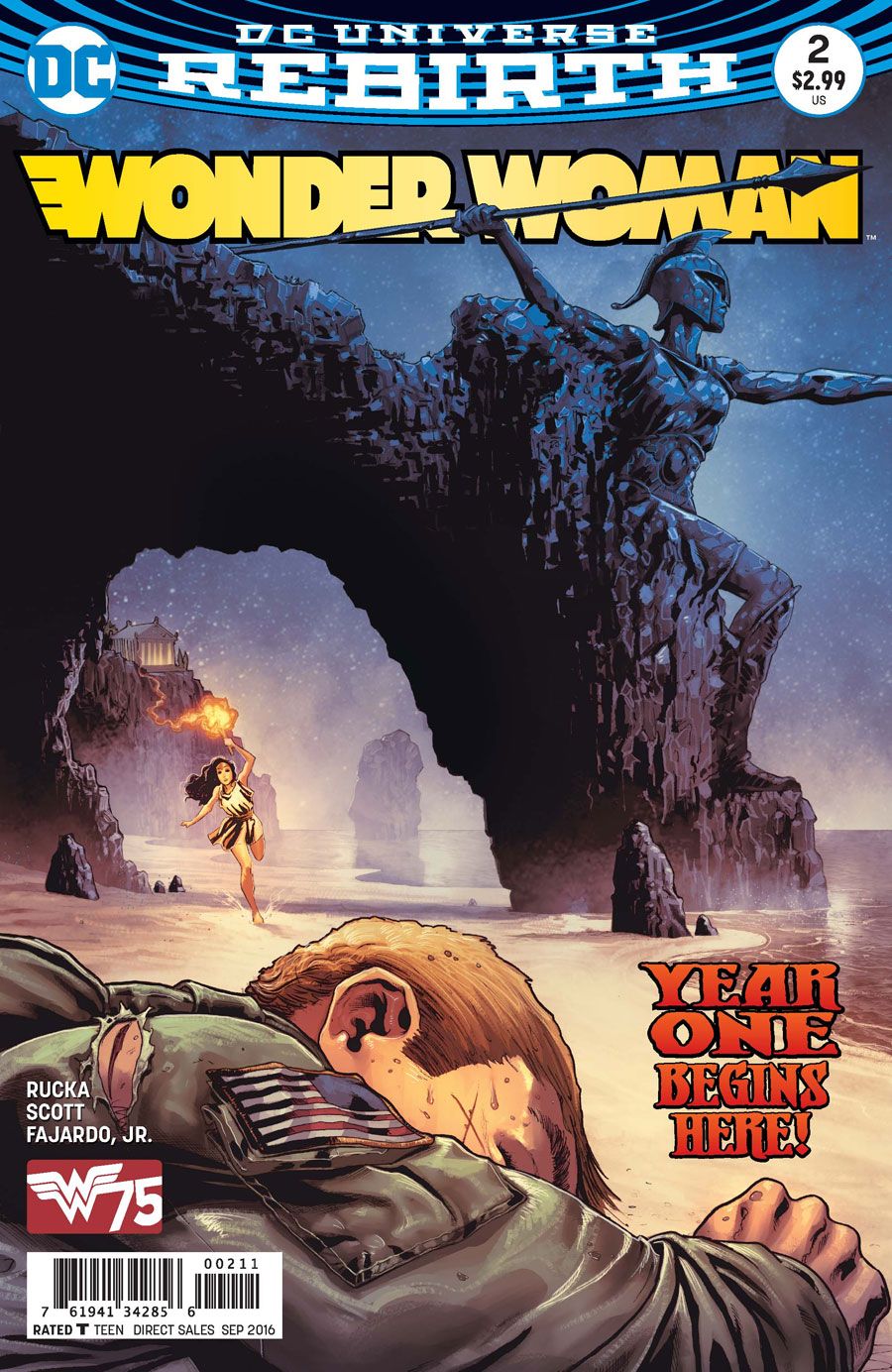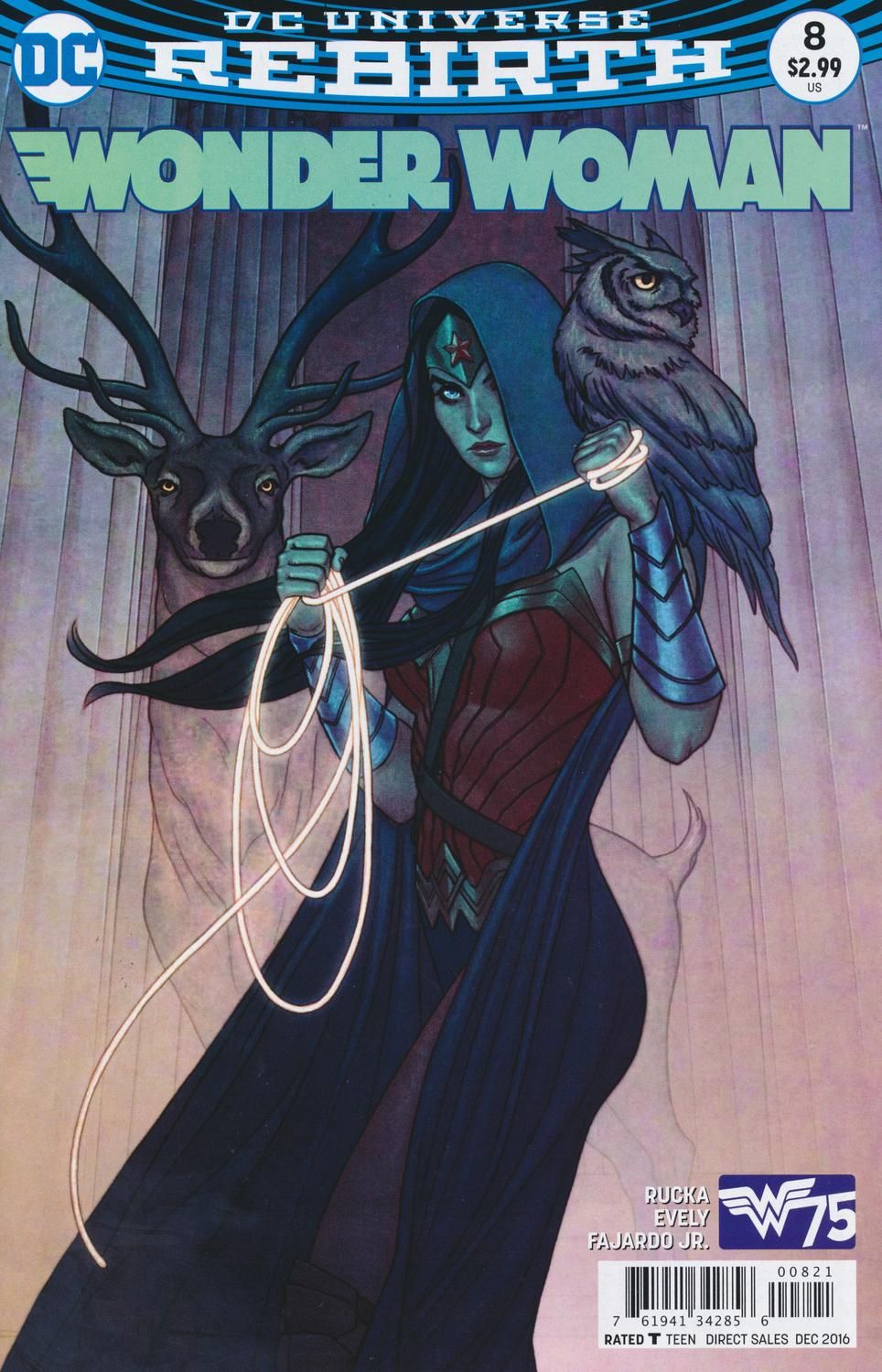2016 is a big moment for Wonder Woman. Not only does this month mark the superhero's 75th anniversary, having debuted in October 1941's "All Star Comics" #8 as created by William Moulton Marston, and rising to the status of genuine pop culture icon in subsequent decades, in just the past few weeks, Wonder Woman has been named an honorary United Nations ambassador (in something of a controversial move), and has been featured in a line of recently unveiled U.S. Postal Stamps. Of course, that's all on top of escalating hype for the upcoming "Wonder Woman" movie, directed by Patty Jenkins, starring Gal Gadot and scheduled for release in June 2017 -- the first feature film to star the character, and only the second time she's appeared on the big screen in a live action adventure.
Yet Wonder Woman is a comic book character first and foremost. The writer currently in charge of guiding her twice-monthly adventures is Greg Rucka, who returned to Diana Prince earlier this year as part of DC Comics' ongoing back-to-basics-ish "Rebirth" initiative. Rucka has used the accelerated release schedule to the book's advantage, with alternating issues taking place both in the present, illustrated by artist Liam Sharp; and in the past, with Rucka partnering with his "Black Magick" collaborator Nicola Scott for a "Year One" origin story.
RELATED: Do We Still Need Wonder Woman After 75 Years?
Not only has "Wonder Woman" been one of the most critically acclaimed books in DC's Rebirth lineup, it's also proven to be one of the most newsworthy. In late September, Rucka discussed Wonder Woman's nuanced sexuality, making it clear that Diana is canonically queer -- not necessarily surprising for a character that hails from a paradise island of only women, but still something that generated plenty of discussion and headlines.
CBR spoke with Rucka in-depth about "Wonder Woman" earlier this month at New York Comic Con, to further discuss the conversation around Wonder Woman's sexuality, the recurring problem with her rogues gallery, why he sees Cheetah as the Two-Face to Diana's Batman and how Wonder Woman's origin story isn't as complicated as people seemingly want it to be.
CBR: Greg, late last month, an interview you did with Comicosity that discussed Wonder Woman's sexuality generated a lot of subsequent coverage. I don't want to make this interview about another interview you did, but what was your take on how that story took a life on its own, and the reaction to your comments?
Greg Rucka: I think we saw the reaction of a lot of people who don't know anything about the character, and are deciding this is yet another hill that they're going to stand their ground on. I rate this in the same place as saying, "You did a Ghostbusters movie, and they're all women! You ruined it!" Really? I mean, really?
I was asked a specific question at point blank. DC would not want me to lie, or prevaricate, and I am not serving the character well or doing my job if I lie or prevaricate. Representation matters enormously.
I honestly think, if we really want to drill down on this, at the heart of the negative response -- and the negative response has been loud and vocal, but from a minority, and a very small minority -- you're seeing the response of people going, "I didn't want to have to talk about that!" OK, but the people out there who need to hear it, I care far more about them. I guarantee you, if we lost readers over this, we gained more.
For people to go, "It's a publicity stunt" -- no, it's not. You'll see it's just another element of the character. It's like when we were talking about Kate way back in the day, and I was writing Batwoman. Yeah, she's queer. She's also got red hair and is Jewish. These are elements of character. These are not the definition of character.
One of [Wonder Woman's] powers is love. One of her patron gods is Aphrodite! Aphrodite's portfolio is love! She goes out there with an open hand. She doesn't go into the world with a closed fist. Batman goes into the world with a closed fist. Batman's solution to most problems is, "How hard can I hit it, and where?" Diana's solution to most problems is to say, "I want to understand, come with me." A lasso of truth -- that demands understanding. That is the nature of what truth is. "For me to find truth, I have to understand. For me to understand you is to know you. How do I not know you and then not be able to love you?" These are fundamental things.
I'm no more surprised by it than I am surprised by the fact that there are racists, homophobes, misogynists, Gamer Gater, MRA motherfuckers out there. It comes with the territory. This is where we live.
Right, and as you said, it's a small minority -- there are definitely a lot of people who had a very a positive reaction, seeing it as empowering. Even for people who know the character, and may see it as something obvious, it's only really been subtext up to this point.
But it's not! This is not news. Other writers have done this. Other writers have said this. It's in the text. The moment a lot of people are looking for, I'm not sure is ever going to be a moment in my run, because I'm going to serve the character and story as needed.
As you called it, the "Northstar Problem." [A character vocally proclaiming his or her sexuality.]
Exactly. Look, we saw Themyscira and her life in "Year One." She is who she is. Saying she's queer, saying she's pan -- all true. Her true love's also Steve Trevor, and that has always been canon. I'm not going to say one thing and then ignore this other truth about the character. They're not in opposition. It's the people who responded and heard one thing, thought they heard something else, then came back and said, "What about Steve Trevor?" You didn't read what was said, then. You did not read the interview. You're responding to somebody's clickbait headline. People who know know, and that's fine.
I think we are past this. I think, for the vast majority of people, they're like, "Why are we still talking about this?" And I think, for a needed portion, it's like, "We are talking about it, and good!" And then there's a group of people who are like, "Aah! You broke my toy!" Number 1, not yours. Number 2, what you want to imagine -- fine, it's up to you.
Let's talk about "Wonder Woman" #8, the "Year One" interlude illustrated by Bilquis Evely, and focusing on Barbara Ann Minerva, the future Cheetah.
It pre-dates the curse. It pre-dates Diana's arrival in Year One. We meet Barbara Ann at age 8, then you meet her at about age 23, 24. It's her story about a lifelong fascination and pursuit of the Amazons, from an academic and scholarly perspective.
In the same way that Steve in Year One is paralleled with Diana and there's a destiny there, Barbara Ann's had a destiny, too, that she has been an unwitting part of. That's what "Wonder Woman" #8's about.
Have you found that Wonder Woman, for as iconic of a character she is, her villains really aren't at that same level?
She has a weak rogues gallery. One of the reasons I think her rogues gallery has been weak is because a lot of them are presented ideologically rather than character. One of the beauties in Batman's rogues gallery is that almost every one of his rogues, with the notable exception of the Joker -- and I think you break the Joker when you try to understand him too much -- is that you get their pathos. Harvey breaks your heart. You get Two-Face. You don't get that with a lot of Diana's antagonists. A lot of Diana's antagonists are antagonists because they disagree with her because -- "woman." Or -- "too beautiful." You don't have a pathology there.
They're also all doctors. Go down the line. Doctor Cale. Doctor Psycho. Doctor Poison. Doctor Cyber. Apparently, you have to have an M.D. or a Ph.D. to not like Wonder Woman.
Clearly, Cheetah's a character you have a lot of interest in.
I wanted, very actively, for Barbara Ann to be Diana's Harvey Dent. Barbara Ann should be the friend. If she's that friend, she needs to be that friend to all of them. She has to be somebody Steve was close to. She has to be somebody Etta was close to before this thing happened. You need to be able to love her. And to love her, you have to understand her. That's what this is about.
It also comes in the perfect time, because "Year One" Part 3, we have introduced that young Barbara Ann. You see how she enters into the mythology. In "The Lies" Part 4, we've now seen Barbara Ann cured of the Urzkartaga curse. This was the perfect time to say, "Here's how this woman got here." And now you get to see her moving forward.
A lot of the Wonder Woman villains also have overly complicated back stories -- they've been reinvented so many times.
And vague! I was doing some research -- Dr. Cyber's name is Cylvia, with a "C," Cyber. What am I supposed to do with that? Dr. Poison? She was Russian. Her last name is "Maru." When we did Cale way back the first time around, [editor] Ivan [Cohen] and I spent hours talking about, "What's the pathology here? What is the issue? What is going to make her a good antagonist for Diana?" It's the fact that she looks at her and says, "I disagree with every single thing you represent." Not from a feminist point of view, but from a feminist argument; which is, you're selling a bill of goods. "I had to earn it! I had to work at it! You're out there saying, 'Hey, you can be just like me.' No, you can't! The gods don't go around blessing everybody. Some of us had to work our way out of poverty!"
A good villain should be a villain when you sit and really think about it, you go, "I kind of see where they're coming from. I kind of get it." One of the thing that we want with Cheetah is, and you see it at the end of "Year One" Part 3, Barbara Ann doesn't believe in gods. Etta says, "Well, there's an alien flying around Metropolis." Barbara Ann's response is, "A belief in extraterrestrial life is scientifically sound." You're asking me to believe in the supernatural -- and they look and there's Diana and she's taking the whole wall off. For that moment, Barbara Ann's like, "Holy shit, it's real. Everything this woman has just said about Athena, Hermes, Demeter, Hephaestus, Hera -- they're real." The second you give her that, you see how that woman can end up in a situation where Urzkartaga says, "You're mine now." You can see how the best intentions lead to a hubris that trap her.
From that, you can see how becoming Cheetah, she would look at Diana and say, "This is your fault. You did this to me. You did this to me. Until you came along, none of this was possible." The second you get that, how does your heart not break for her a little bit? Especially when she says, "We were friends," and Diana says, "Yes! And I still am. And I warned you. I said don't, and you did it anyway." That, to me, is far more compelling. That's the kind of stuff that should make tears well in your eyes, and make your heart hurt. In the same way that in the best Batman/Two-Face stories, you see Harvey reaching out, and you see Bruce inside the cowl going, "Come back!" And then the coin lands the wrong way.
Similar to the villains, Wonder Woman feels shortchanged in terms of origin -- when you think about DC's Trinity, obviously Batman's origin everyone knows, Superman, everyone knows. Wonder Woman, it's harder to easily explain.
But it isn't. There's been this really weird fascination with her birth. With Batman and Superman you never go, "How were they born?" That's been confusing. Her origin's actually quite simple. She is from a mythological paradise only of women, that is this warrior culture. She leaves her home, never to return, when a stranger crashes on their shores, and heralds a great evil that they have to fight. She's the one who goes. And she goes willingly, and she abandons everything she's known to go into this strange new world, with this stranger, to save us all. That's the origin story. Then on the way, she gets this power set.
I think the things that's been missed and ignored over the years, and it's logical why, is that she leaves believing she can never return. The reason that gets lost is, because she goes back all the goddamn time. She goes back home because we all love telling stories about Themyscira. We want to tell stories about the other Amazons. It's cool! It's fun! You get all the myth. But it would be like giving Superman Krypton back, and then never taking it away again. And they've done plenty of stories where Superman's been able to reach back to Krypton in one way or another, but Krypton never remains. It's always lost again.
I do think we forget -- this moment is huge. If you think about what it means, and what it means in terms of heroism, that she leaves everything she's ever known -- and everything she's ever known is paradise and immortality -- and she does it because this guy showed up and her people were like, "This means we have to act, there's a duty here." And she's the one, who could have gotten out of it, because mom's queen. Mom's like, "I don't want you to go." Mom could have said, you're not going. She's like, "No, I have to go. I have to be the one to go."
She's the one choosing -- it's not out of obligation or guilt.
It's in her nature to want to do it. I think that's part of the "Wonder" in "Wonder Woman." She wonders. The other Amazons don't wonder. They don't give a rat's ass what's happening outside of Themyscira. "It's man's world! He's fucking it up same as he ever did." They don't care, and Diana's like, "I want to see it. I want to know. I want to meet them. I need that." That's part of her, and from that, you get the truth of her, which is, a pursuit of truth. To pursue truth, you have to crave understanding.
I don't think about this at all, Albert. [Laughs]
When you were announced as coming back to "Wonder Woman" for Rebirth, I don't think most people expected to see you back at DC. Plus it seemed like you were drifting away from superhero comics in general and focusing more on your creator-owned work. Obviously, you wouldn't be doing it you didn't want to, and it's clear from this interview how energized you are by the series. How much fun has this experience been for you?
It's been amazing. I am in a golden age of collaboration right now. I'm working with Michael Lark and Nicola Scott on creator-owned stuff, I'm working with Nicola and Liam and Bilquis [on "Wonder Woman"], I'm working with Justin Greenwood on "Stumptown." Everybody surrounding "Wonder Woman" specifically, the team's just phenomenal. Laura [Martin], Romulo [Fajardo Jr.], Jody [Wynne], Mark Doyle, Chris Conroy, Rebecca Taylor, David Wielgosz, everybody. It's phenomenal. Jenny Frison on the variants, she's so passionate, and so engaged. Everybody's passionate, nobody's holding anything back, no idea is rejected, everybody's got a voice.
If you had asked me last year, "Do you see yourself working at DC?" I would have been like, "No!" This time last year, I would have been like, "Hell, no!" Then they called. There were three characters that would have gotten me to answer the phone. This was number one. They made their pitch, and I listened.
Look, I left under a cloud. I left because it was a bad experience and bad circumstances. "We need to make sure that doesn't happen again. If we can make sure that will not happen again, I'm more than happy to talk shop." DC stepped up. They worked very hard to make it so I could return to do this, and return to do this in a way that that was positive, and where I felt backed. Where I felt secure.
This feels unique for you, and you've certainly worked on a lot of books, a lot of characters.
Never like this. It's been awesome. It's just been wonderful. I think it shows on the page. That's really where it matters. Does it show on the page? It if shows on the page, we're doing the job.
"Wonder Woman" #9, by Greg Rucka and Liam Sharp, is on sale now.

